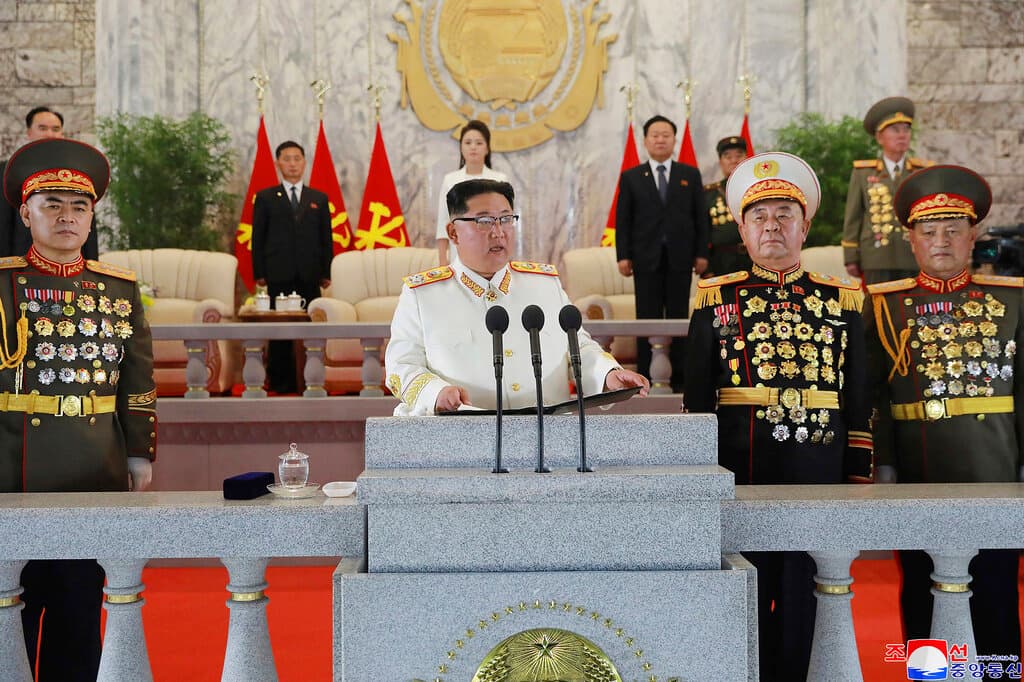Pathos of Peace Protest in South Korea Arises From Its Naivete
North Korea wants the end of the war to be declared before it’s over.

IMJINGAK, South Korea — The shattered hulk of a steam locomotive that was caught in an artillery barrage rests on rusting tracks here in mute testimony to the battles that raged south of the 38th parallel dividing North Korea from South Korea after the communist invasion of the South in June 1950.
For about 2,000 people at a protest rally a hundred yards away, the horrors of the invasion were forgotten last weekend amid shouts of “End the Korean war,” including a halt to American and UN sanctions against North Korea and to war games by American and South Korean troops.
The protesters timed their rally to precede the 69th anniversary Wednesday of the signing of the truce that ended the fighting on July 27, 1953. They’re part of a global movement that insists the war isn’t over until the Americans, the North Koreans, and the Chinese Communists, whose forces rescued the North from total defeat, have signed a peace treaty under which Washington would withdraw its 28,500 troops and give up its alliance with South Korea.
The pathos of the protest, which I attended, was that it was so futile, so naïve, so uninformed and misleading. The protesters, asking people to sign an “End of Korean War” petition, said not a word about North Korea’s nuclear program or the missiles built to carry warheads to targets anywhere from South Korea and Japan to the American mainland.
“Create a Korean peninsula and a world free from nuclear weapons and nuclear threat,” a leaflet handed out at the rally said. “Resolve the conflict with dialogue and cooperation instead of sanctions and pressure.”
Left unmentioned was that Kim Jong-un has ignored requests for dialogue. Nobody believed the warning of the conservative South Korean president, Yoon Suk-yeol, talking in Seoul, 40 miles south of here, that the North is “fully ready and able” to conduct its seventh nuclear test.
One of the more moderate people whom I met acknowledged that Mr. Kim had never responded to pleas to consider a “non-aggression agreement” and certainly had shown no signs of giving up his nuclear program, so far including six nuclear and multiple missile tests. “That’s a problem,” she said, expressing confidence that he would opt for peace once the Americans had pulled out.
The protest was all the more saddening considering that Mr. Kim’s primary concern in deciding when to order another nuclear test is not peace but the impact of the Covid pandemic on the poverty-stricken North Korean economy.
If he’s not too worried about the suffering of millions of impoverished, hungry citizens, he still has to consider his inner circle, including his younger sister, Kim Yo-jong. He controls those around him with an iron fist, but he has to be attuned to their needs to be sure of unswerving loyalty.
The protest here was organized by several hundred peace-oriented groups, some of which are quite moderate. Superficially, the mood was exuberant, entertaining, and fun. Singer Lee Eun-mee, a local celebrity and fervent advocate of the peace movement, sang three songs on the theme of peace to immense applause. Many of the young people joined in dancing and clapping hands.
None of them believed that South Korea, freed from ties to Washington, would be exposed to North Korean attack backed by China, which fought to insure the survival of the Communist dynasty in Pyongyang in the Korean War. None imagined the Russians would also support the North Koreans just as the Soviet Union had provided air support and vital military supplies during that dreadful conflict that cost at least four million lives, the majority civilians.
In fact, however, the real forces behind the protest were far-left groups playing into the hands of the North Koreans, whose demands they echo and support politically. These organizations nurture ties with pro-North groups in America that have focused on lobbying Congress to enact legislation for “ending” the war.
One of the major points of the protest was opposition to joint military exercises, which these people say is responsible for keeping Korea on a war footing. North Korea has been propounding this line with increasing fierceness as American and South Korean troops plan for their first war real war games, on the ground, in the air, and at sea, since President Trump, in one of the dumbest moves of his presidency, canceled them after his summit in Singapore with Mr. Kim in June 2018.
The deputy director of a think tank run by North Korea’s foreign ministry, Choe Jin, in an interview with Associated Press TV News in Pyongyang, warned of “unprecedented instability” as a result of the exercises. Washington’s “anachronistic and suicidal policy of hostility,” he said ominously, would have “an undesirable consequence.”
That’s exactly the rhetoric that we were hearing at the protest. Most of those who were there were blissfully unaware they were playing into the North Korean line.
The protesters sugar-coated what they were saying, declaring, in one leaflet published in English, that the Korean peninsula was “a symbol of confrontation and conflict.” The message: “Let’s end the Korean War now with our own hands and make a future that could not be achieved for the last 70 years.”
A nice sentiment indeed — except these people have no idea they’re being misled into saying exactly what Kim Jong-un wants to hear. Meanwhile the North is building ever more missiles and nukes for the express purpose of destroying the South Korean democracy that gives these protesters the right to demonstrate freely on North Korea’s behalf.

